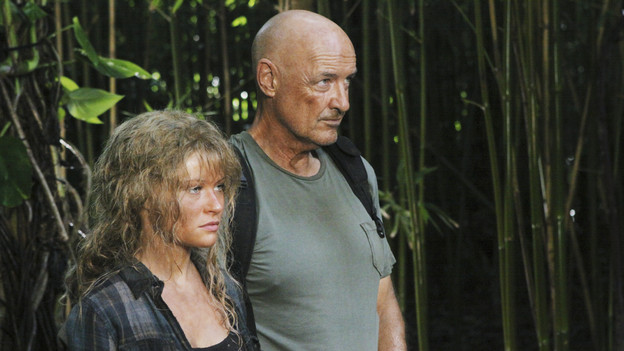109 episodes in, and only now am I going to start trying to write about individual episodes:
Lost, "Sundown" (season 6 episode 6)
"Sundown" certainly did not lack for action (or body count.) Sayid and Dogen fought in Dogen's office, Smokey had some issues with the temple Others, Sayid settled some differences with Dogen and Lennon, while Ilana, Ben, Sun and Lapidus made it to the temple to save Miles from Smokey.
Spoilers continue after the break

But while this episode had a lot of action, much of it was set in motion for reasons that are still opaque to us as the audience. While we now understand that the flashes to the alternate timeline differ in ways that go far deeper than flight 815 landing safely at LAX, but not yet what relationship they have to our characters on the island. The original flashbacks from seasons 1 and 2 showed how the characters were shaped by the events that led them to the island, that gave the characters new shape and demonstrated some of the motivations (or put twists on those motivations) for why they acted in the way they acted on the island.
So far, season 6's vignettes in the parallel universe have echoed season 1's flashbacks. Like "Tabula Rasa," "What Kate does" was a Kate story, like "Walkabout," "The Substitute" was a Locke episode, and like "White Rabbit," "Lighthouse" featured Jack. But whereas the sixth episode of the show, "House of the Rising Sun," was a Sun flashback, tonight's "Sundown" was a Sayid story.
In parallel 2004, Sayid travels to Los Angeles to see Nadia, who is married to Sayid's brother. In the original timeline, Sayid was working with the CIA to infiltrate a terrorist plot in Sydney in exchange for information on Nadia's whereabouts, as he had not seen her since letting her escape torture and capitivity in Iraq. In the parallel timeline, Sayid was an interrogator in the Republican Guard, but had not lost track of Nadia.
At this point, it's frustrating not to understand more about the mirror universe. We know that despite some major differences (e.g. Jack has a son, Locke has a good relationship with Helen and his father), the characters are largely the same-- Rose still has cancer, Jack still had a difficult relationship with his father, Claire is still having a baby, Kate is still a fugitive, Locke still got rejected from his walkabout, Keamy still makes a mean plate of eggs. In this episode we see that Sayid is still trying to make peace with having served as a torturer for the Republican Guard. Despite that, he wants to be a good man and find some measure of redemption. But he keeps getting sucked back in to torture and murder -- whether it's to extract information from Sawyer, os a hired gun for Ben, or trying to extract his brother from a bad business arrangement in the alternative timeline. Naveen Andrews does a very good job of selling Sayid's understanding that he has done some terrible, unforgivable things in both timelines and wants redemption.
But what's the relationship between the mirror universe and the original one? We don't yet know what the glimpses of the characters' lives in the parallel universe show. Is this what their lives would have been like if they hadn't been influenced by Jacob or the island? (But still were traveling from Sydney to LA on the same day.) Are the two timelines going to come together at some point?
My theory is that despite the differences, the characters are going to largely end up in similar relationships and doing similar actions, because their characters are the same whether they were brought to the island or not. It's not a matter of having a destiny or being played as puppets by Jacob, but that these people use their free will in ways directed by their personalities that bring them to similar places. I worry that if this in fact the relationship between the island and alternate timelines, it will be patently unsatisfying; in the original timeline, we had about 100 hours of story to get the characters to where they were by the end of The Incident, and we're only going to see a few hours of the alternate timeline by the end of the series.
Of more interest in the parallel world, Martin Keamy (originally Widmore's lead mercenary on the freighter who killed Alex, among others) is a gangster (and cook of eggs) who was extorting Sayid's brother. Oh, and he has Jin bound in a freezer. Is Keamy working for Widmore in the alternate timeline? Or does he just have competing interests with Jin (or Jin's employer) and Sayid's brother?
I think part of what I'm finding so odd with this season is the pacing of the various threads. Not only have the relationship between the island and the Others who have been exiled off the island (Eloise, Widmore)
Two episodes ago in The Substitute, we followed Sawyer and Smokey climbing down Jacob's ladder to retreive a Horcrux (or something) and learning the candidate-Numbers connection, but we haven't seen Sawyer since (except for a brief appearance as part of Smokey's entourage). Last week, we followed Hurley and Jack wandering old-school through the jungle to the Lighthouse, but didn't see them at all this week. The show isn't so much juggling these disparate plot threads, but holding them and then throwing them up in the air, letting them fall to the ground, and then picking them up again.
So on the one hand, this episode was effective at moving the story forward, but didn't reveal much of the overarching structure of the story that's being told. If there's some conflict that spans hundreds of years, involves shadowy organizations in the world like Widmore Industries, the Hanso Foundation and the Dharma Initiative, a conspiracy of Others who had some kind of access between the island and the outside world, a frozen donkey wheel, time travel, and a smoke monster, the stakes of season 6 have felt smaller than earlier seasons. Not that it may ever be possible to explain all of those elements-- or that it will be unsatisfying if these questions are never answerd-- but the prior seasons have been effective at raising the stakes with new questions. So far, season 6 has introduced new elements, but hasn't manage to either make these new elements more compelling than those from prior seasons that always appeared to raise the stakes or expand the scope of the world.
At this point, season 6 feels like it's struggling to connect the story that it's been building week to week, much less with much of the foundation laid in the last five years. I suspect that this section of the season will play much better in tighter sequence than one episode per week.
Review and Reaction Roundup
Alan Sepinwall, A history of violence ""Lost" is all about eternal struggles - good vs. evil, science vs. faith, free will vs. destiny - and fundamentally about man vs. his own nature. John Locke wants to be a big man but can't overcome his own smallness. Jack Shephard tries to fix everything and usually winds up destroying it. And Sayid Jarrah wants to be a good man free to enjoy the love of his good woman, but instead he's always the man brought in when people need killing."
James Poniewozik, Time, "When season six started a month ago, fans who had endured a long hiatus expected quick answers. It's the last season, after all; the show ends just a few weeks from now, on May 23. But instead, during the first four weeks of this season, we got new characters like Dogen and Lennon, an elaborate new set at the temple, and SmokeLocke insisting to Sawyer during a long jungle trek that his questions (and, presumably, ours) would be answered if we just keep following. It was a little annoying: it's way past teasing time."
Noel Murray, The AV Club, Sundown "Like “What Kate Does” a few weeks back, I thought “Sundown” was pretty shaky at times, though it ended so strongly—and offered so much to ponder along the way— that I didn’t mind that it was light on incident and heavy on Temple moping. I also didn’t mind that “Sundown” was a Sayid episode that defaulted back to the same set of questions and concerns that have driven nearly every Sayid episode lately: Is this dude a stone a stone-cold killer or what? I didn’t mind it because I thought “Sundown” was one of the most bravely unforgiving episodes yet when it comes to dealing with the question of free will versus fate."
Jeff Jensen, Entertainment Weekly, 'Lost' recap: The Measure of the Man "Last night's episode of Lost, 'Sundown,' reminded us that for all his spirituality, and for all his protest-too-much bleating about being a 'good man,' Sayid has never been able to make peace with his past as a torturer for Saddam Hussein's Republican Guard, as well as the CIA. He's more than mired in his quagmire; he feels like he deserves it. To quote Joseph Conrad, Sayid is a man infected with a self-mortifying, self-corrupting 'fascination with abomination.'"
Maureen Ryan, Chicago Tribune, Let's talk 'Lost': 'Sundown' "What an excellent episode. We got some interesting forward movement on the island, not to mention some wonderfully creepy atmospheric moments on and off the island. Sayid asked a lot of good questions, some of which even got answers We had Sideways and island timelines that were linked thematically and emotionally and thus quite a bit more interesting in tandem than some other Sideways trips."
Todd VanderWerff, LA Times, 'Lost': Sayid loses himself in the dark " Sometimes you watch "Lost" and think about the philosophical conundrums it presents or the way the characters interact. Sometimes you watch it and come away impressed by the show's rock-solid direction or great acting. But sometimes, oh, sometimes, you watch the show and end up feeling that there's just nothing else like it on TV, nothing quite so, well ... awesome. When "Lost" is on, there's nothing quite like it for bringing big, epic moments, and there's never really been anything like it in the history of the medium. It's a big, bold show when it wants to be, and when it pays off a whole bunch of setup with a big, action payoff, it usually delivers."
Myles McNutt, Cultural Learnings, Lost – “Sundown” "The Flash Sideways structure this season has been taking a lot of criticism from those who think that its opaque intentions are obscuring any meaning that it might have, but I think that in terms of its immediate function it has actually been quite clear. As the show confuses the question of identity through the Man in Black and his various influences, the Flashes offer a glimpse at characters in a far less confused universe who are still just as confused as they were before."
Emily Nussbaum, NY Magazine, Tortured Logic "Sorry to go all Lori 'Settle!' Gottlieb on you, but must every character have a soul mate? Desmond, Sayid, Jin, Sawyer, Jack — always mooning, mooning, mooning! And look where it leads them, into whining and, in more extreme cases, blood-soaked evil.
Mike Hale, NYT Artsbeat, Sayid Goes Off, "For all the hyperventilating in other forums about Sayid as a born killer, the show has made the case in the past for his essential goodness, and he’s being manipulated now by Fake Locke. Do we really think that any of the show’s central characters won’t, in the end, find some kind of redemption?"
Isaac Spaceman, A List of Things Thrown 5 Minutes Ago, Kate, Separated From The Group Again, Wishes She Had Not Scoffed At The Idea Of A Line Buddy

Leave a comment